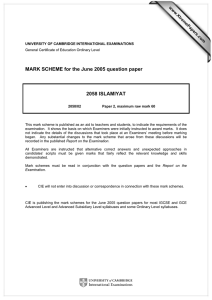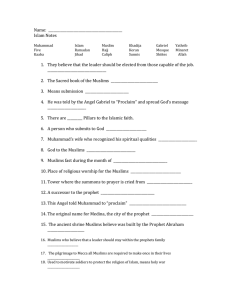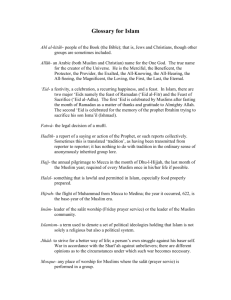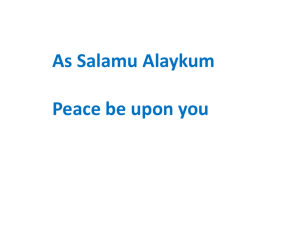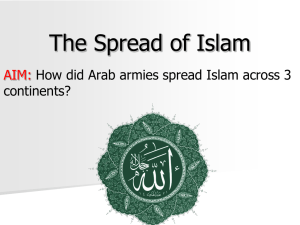MARK SCHEME for the June 2005 question paper 2058 ISLAMIYAT
advertisement
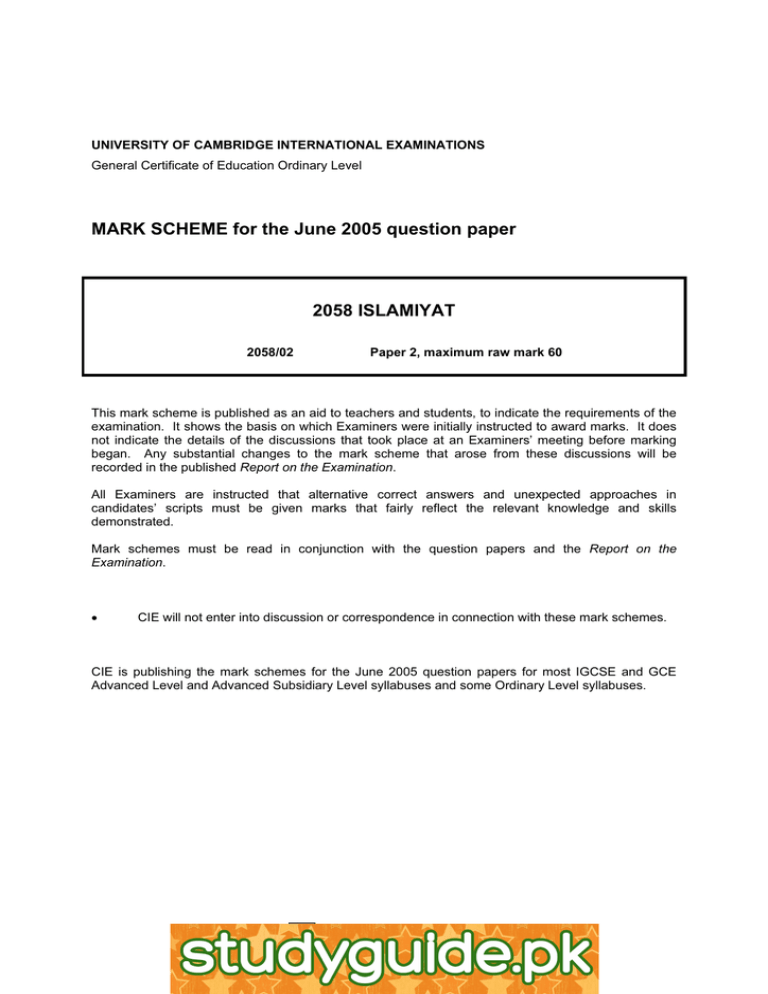
UNIVERSITY OF CAMBRIDGE INTERNATIONAL EXAMINATIONS General Certificate of Education Ordinary Level MARK SCHEME for the June 2005 question paper 2058 ISLAMIYAT 2058/02 Paper 2, maximum raw mark 60 This mark scheme is published as an aid to teachers and students, to indicate the requirements of the examination. It shows the basis on which Examiners were initially instructed to award marks. It does not indicate the details of the discussions that took place at an Examiners’ meeting before marking began. Any substantial changes to the mark scheme that arose from these discussions will be recorded in the published Report on the Examination. All Examiners are instructed that alternative correct answers and unexpected approaches in candidates’ scripts must be given marks that fairly reflect the relevant knowledge and skills demonstrated. Mark schemes must be read in conjunction with the question papers and the Report on the Examination. • CIE will not enter into discussion or correspondence in connection with these mark schemes. CIE is publishing the mark schemes for the June 2005 question papers for most IGCSE and GCE Advanced Level and Advanced Subsidiary Level syllabuses and some Ordinary Level syllabuses. www.xtremepapers.net June 2005 GCE ORDINARY LEVEL MARKING SCHEME MAXIMUM MARK: 60 SYLLABUS/COMPONENT: 2058/02 ISLAMIYAT Paper 2 www.xtremepapers.net Page 1 1 Mark Scheme ISLAMIYAT – JUNE 2005 Syllabus 2058 Paper 2 Comment on the meaning and importance of any seven of the words or phrases underlined in the following passages. [14] (a) Sura 8.44-5 And remember when you met, he showed them to you as few in your eyes,(1) and made you appear as contemptible in their eyes; so that God might accomplish a matter already enacted.(2) For to God all matters go back. O you who believe! When you meet a force, Be firm, and remember God much, so that you may prosper.(3) he showed them to you as few in your eyes • • • This refers to the Battle of Badr, when the Meccans appeared to the Muslims as fewer than they really were. God performed this miracle in order to hearten the Muslims. (Candidates must include this or a similar comment to gain a second mark) a matter already enacted • • The Battle of Badr was fought fiercely between both sides. But God already had decided the outcome. remember God much, so that you may prosper • • In the Battle of Badr the Muslims won by depending on God. All Muslims should follow this example and they will prosper against any odds. (b) Sura 28.30-1 But when he came to it,(4) he was called From the right bank of the valley, from a tree in hallowed ground: ‘Moses! I am indeed God, the Lord of the worlds.’(5) ‘Now throw down your rod!’(6) But when he saw it moving, as if it were a snake, He turned back in retreat, and did not retrace his steps. ‘Moses! Draw near, and do not fear: for you are one of those who are secure.’(7) But when he came to it • • This refers to the fire which Moses saw burning in the distance. It was a tree burning by God’s power and was not burnt up. I am indeed God, the Lord of the worlds • • God addresses Moses directly. He informs Moses of who he is and of his power. © University of Cambridge International Examinations 2005 www.xtremepapers.net Page 2 Mark Scheme ISLAMIYAT – JUNE 2005 Syllabus 2058 Paper 2 Now throw down your rod • • The rod turning into a snake is a sign for Moses. This is to reassure him that God is with him. you are one of those who are secure • • Moses is informed that God has chosen him as a messenger. Therefore God will protect him. (c) Sura 107 Have you seen the one who denies religion?(8) He is the one who repulses the orphan, And does not encourage the feeding of the poor.(9) So woe to the worshippers, Who are neglectful of their prayers; Who want to be seen, But refuse neighbourly needs.(10) the one who denies religion • • This is the hypocrite (munafiq) who pretends to believe but does not. His actions do not match his pretended words. And does not encourage the feeding of the poor • • Concern for other people’s needs is a part of faith. Hypocrites pretend to be concerned but do nothing about the needy. Who want to be seen But refuse neighbourly needs • • 2 Hypocrites want to make a show of their beliefs. They have no concern for others around them. Comment on the teachings in seven of the following Hadith about what Muslims should believe and how they should act. [14] (a) Actions are judged by intentions. • • A person’s action depends on what is meant behind it. He should be judged by what he meant rather than what he did. (b) The best remembrance is, ‘There is no god but God’, and the best prayer is, ‘Praise be to God’. • • • • Belief that God is one is central to Islam. Praise is the first and highest form of prayer. Muslims should be aware of God at all times. Their awareness of him should influence all they do and say. © University of Cambridge International Examinations 2005 www.xtremepapers.net Page 3 Mark Scheme ISLAMIYAT – JUNE 2005 Syllabus 2058 Paper 2 (c) Each of you is a custodian, and each of you will be held responsible for those in your care. • • All believers are part of the whole Muslim community. Believers should take care of those for whose welfare they are accountable. (d) One who cheats is not among us. • • • Cheating involves treating others unfairly. People who do this cannot be regarded as part of the believing community. People must be fair in their commercial dealings. (e) Worship is a pillar of religion. • • Islam is founded on praying to God and serving him. Regular worship maintains a Muslim’s (and all Muslims’) faith. (f) For every disease there is a remedy, and the remedy for sinning is to seek forgiveness. • • Sin is like an illness; it must be cured. Asking God for forgiveness is the best cure. (g) Give food and give greetings to those you know and those you do not know. • Muslims should be friendly towards everyone whether known or unknown, whether Muslims or not. • Muslims should act generously to everyone. (h) Sincerity leads to godliness, and godliness leads to paradise. • • Sincerity in attitude can bring the reward of paradise. Acting sincerely in relationships with people is an act of piety. (i) Purity is half of faith. • • • Pure thoughts are a large part of Muslim beliefs. Purity in actions towards others is a sign of being a Muslim. Physical cleanliness is important at all times in Islam. (j) One believer with another believer is like a building, one part strengthens another. • • 3 Muslims should be ready to depend on one another. They should be ready to support and to receive support from other Muslims. (a) Describe the teachings of Islam about the position of women as (i) wives; • • • • • [4] Wives are equal to their husbands. They are partners with their husbands in family life. They have financial independence. They are primarily responsible for the home. They have a right to divorce. (1 mark for use of quotations from the Qur'an and examples from the life of the Prophet, as long as they are used to support points.) © University of Cambridge International Examinations 2005 www.xtremepapers.net Page 4 Mark Scheme ISLAMIYAT – JUNE 2005 Syllabus 2058 (ii) mothers; • • • Paper 2 [4] They have the main responsibility for bringing up children. They are the first teachers of faith and proper conduct. They deserve respect from their children because of what they have done for them. (1 mark for use of more than one quotations from the Qur'an and examples from the life of the Prophet, as long as they are used to support points.) (iii) daughters. • Daughters should be cared for as carefully as sons. • They should always be allowed freedom in choices. • They have a right to their parents’ legacy. [3] (1 mark for use of one or more examples from the Qur’an and the life of the Prophet, as long as they are used to support points.) (b) Explain the teachings of Islam about the relationship between men and women. [5] • • • • • • 4 Men and women should be respectful in one another's presence. They should be modest in one another's presence. Unmarried men and women should not be alone together, unless they are close relatives. In marriage men and women should cooperate as partners. While husbands take initiatives in the partnership, they should consult their wives' interests. (a) Write an account of the major contributions made to Islam by Abu Bakr: (i) during the Prophet’s lifetime; • • • • • • • • • He was the Prophet’s friend from childhood. He was one of the first to accept Islam. He brought others to accept Islam. He remained loyal to the Prophet at all times, good and bad. He expressed belief in the Prophet’s Night Journey. He bought slaves who were Muslim and freed them. He accompanied the Prophet on the hijra. He gave his daughter `A’isha to be the Prophet’s wife. He made a financial contribution to the expedition to Tabuk. (ii) during his caliphate. • • • • • • [4] [8] He steadied the mourning community after the Prophet’s death. He continued the Prophet’s intention to send expeditions to the north. [1 mark for the basic point, and 1 extra mark for details] He fought against the tribes who withheld zakat. He fought against the false prophets. These were Musaylima, Tulayha, Aswad al-Ansi and Sajjah. [1 mark, but 2 marks if all four names are given] He arranged to have the first collection of the Qur’an made. [1 mark, but 2 marks for details of how this happened] © University of Cambridge International Examinations 2005 www.xtremepapers.net Page 5 Mark Scheme ISLAMIYAT – JUNE 2005 Syllabus 2058 Paper 2 (b) Explain why he was known as the Honest One (al-Siddiq), and the Saviour of Islam. [4] • • • 5 He was given the title of al-Siddiq after he declared without hesitation that he believed the Prophet had been taken to Jerusalem on the Night Journey. It also suits his conduct of showing complete loyalty towards Muhammad. He was acknowledged as the Saviour of Islam because of his efforts to keep the community united, to resist the threat from tribes withdrawing from Islam, and to destroy the false prophets. [1 mark, but 2 marks for all of these points] Explain the importance of the following figures during the lifetime of the Prophet: (a) Abu Talib; • • • • [4] He trained the Prophet as a merchant. He brought him up after his grandfather’s death. He protected him against his enemies in Mecca. [1 mark, but 2 marks for explanations of how he could do this under the tribal structures of the time] He shared in many of the Prophet’s hardships. (b) Bilal; • • • [4] He was a slave who became one of the first Muslims. He was tortured mercilessly but never gave up his faith. [1 mark, but 2 marks for full details of his conduct under torture] He was appointed as the first muezzin in Islam. (c) Abu Sufyan; • • • • • • [4] He was a merchant and one of the leaders of Mecca. He became one of the Prophet’s main opponents. The Battle of Badr was fought over his caravan. He led the Meccan army at the Battle of Uhud. After much resistance to the Prophet he finally reached an agreement with him and became a Muslim. Meccans who gathered in his house when the Prophet entered the town were guaranteed safety. (d) the Ansar. • • • • • [4] They were people of Medina who accepted Islam. They helped the Muslim emigrants (muhajirun) when they came north. They shared their possessions with them. They took them as brothers. They helped the Prophet against unbelievers in Medina. © University of Cambridge International Examinations 2005 www.xtremepapers.net

